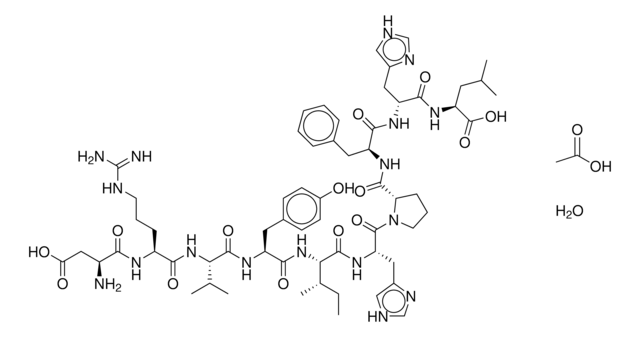A1527
Adrenocorticotropic Hormone Fragment 7-38 human
≥97% (HPLC)
Sign Into View Organizational & Contract Pricing
All Photos(1)
About This Item
Empirical Formula (Hill Notation):
C167H257N47O46
CAS Number:
Molecular Weight:
3659.11
MDL number:
UNSPSC Code:
51111800
NACRES:
NA.77
form:
powder
Assay:
≥97% (HPLC)
Recommended Products
sterility
non-sterile
Quality Level
Assay
≥97% (HPLC)
form
powder
UniProt accession no.
storage temp.
−20°C
Gene Information
human ... POMC(5443)
Amino Acid Sequence
Phe-Arg-Trp-Gly-Lys-Pro-Val-Gly-Lys-Lys-Arg-Arg-Pro-Val-Lys-Val-Tyr-Pro-Asn-Gly-Ala-Glu-Asp-Glu-Ser-Ala-Glu-Ala-Phe-Pro-Leu-Glu
Application
Adrenocorticotropic hormone fragment 7-38 human has been used as astandard in external calibration for mass spectrometry.
Biochem/physiol Actions
Adrenocorticotropic hormone (ACTH) is a polypeptide hormone thatstimulates adrenocortical activity. It is produced by the prohormoneproopiomelanocortin (POMC), which is synthesized in the corticotroph andmelanotroph cells found in the intermediate and anterior lobe of the pituitarygland and the arcuate nucleus of the hypothalamus. ACTH is also synthesized inthe skin. It plays a role in controlling steroidogenesis in the adrenal glandand prevents reactive oxygen species (ROS)-induced cell toxicity. Higher levelsof ACTH lead to skin hyperpigmentation due to the hyperstimulation ofmelanocytes, characteristic of primary adrenal insufficiency (PAI). Deficiencyof ACTH synthesis, receptors, or signaling is associated with adrenalinsufficiency.
Other Notes
ACTH fragment that is a potent inhibitor of ACTH-stimulated adenylate cyclase.
Lyophilized from 0.1% TFA in H2O
Storage Class Code
11 - Combustible Solids
WGK
WGK 3
Flash Point(F)
Not applicable
Flash Point(C)
Not applicable
Personal Protective Equipment
dust mask type N95 (US), Eyeshields, Gloves
Choose from one of the most recent versions:
Already Own This Product?
Find documentation for the products that you have recently purchased in the Document Library.
Customers Also Viewed
Juan Castillo et al.
The Journal of endocrinology, 196(2), 313-322 (2008-02-07)
Steroidogenic acute regulatory protein (StAR) transfers cholesterol over the inner mitochondrial membrane. In mammals, StAR controls this rate-limiting step of steroidogenesis, but its expression and regulation has not been well explored in fish. The present work investigates StAR mRNA expression
V L Clifton et al.
The Journal of clinical endocrinology and metabolism, 81(4), 1406-1410 (1996-04-01)
During human pregnancy, ACTH is produced by both the placenta and fetal pituitary. ACTH has been shown to cause vasodilatation in the adrenal cortex in vitro. In this context we have investigated the vasoactive effects of ACTH in the human
Adrenocorticotrophic hormone modulates Escherichia coli O157:H7 adherence to porcine colonic mucosa.
Kristin L Schreiber et al.
Stress (Amsterdam, Netherlands), 8(3), 185-190 (2005-12-06)
Exposure to stress is associated with susceptibility to disease and one stress mediator, norepinephrine, has been reported to enhance the adherence of enterohemorrhagic Escherichia coli O157:H7 (EHEC) to the colonic mucosa. We tested the hypothesis that adrenocorticotropic hormone (ACTH) and
L K Malendowicz et al.
The Journal of steroid biochemistry and molecular biology, 67(2), 149-152 (1999-01-07)
Corticotropin-inhibiting peptide (CIP), the 7-38 fragment of human ACTH(1-39), is known to act as an antagonist of ACTH receptors. Accordingly, CIP has been found to inhibit ACTH-stimulated glucocorticoid secretion of dispersed rat adrenocortical cells, without per se affecting the basal
L K Malendowicz et al.
The Journal of steroid biochemistry and molecular biology, 70(4-6), 185-188 (2000-01-06)
Orexins-A and B are two novel hypothalamic peptides, which, like leptin and neuropeptide-Y (NPY), are involved in the central regulation of feeding. Since leptin and NPY were found to modulate adrenal function, we have examined whether orexins are able to
Our team of scientists has experience in all areas of research including Life Science, Material Science, Chemical Synthesis, Chromatography, Analytical and many others.
Contact Technical Service






![[Glu1]-Fibrinopeptide B human ≥90% (HPLC)](/deepweb/assets/sigmaaldrich/product/structures/122/537/7ead5c32-cb67-4325-9ce7-66c8dec24bdd/640/7ead5c32-cb67-4325-9ce7-66c8dec24bdd.png)



